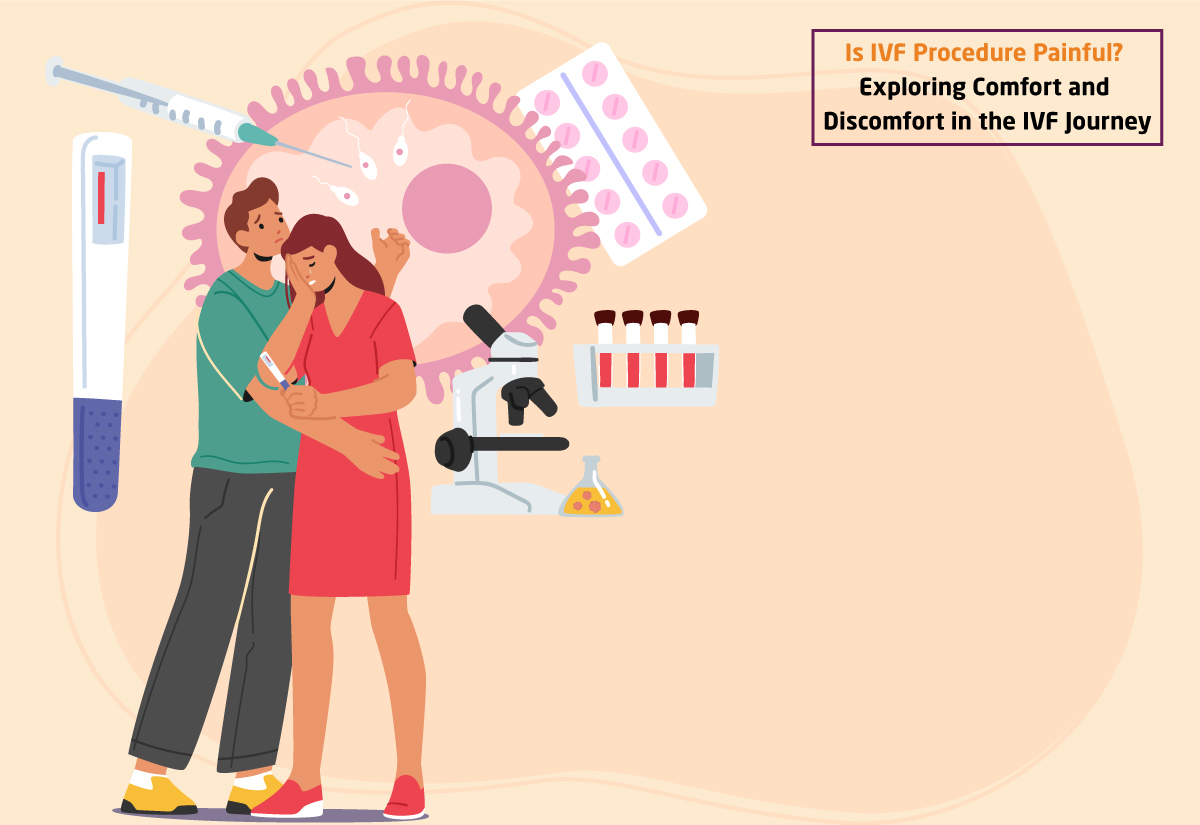Is IVF Procedure Painful?
IVF, or in vitro fertilization, is a popular form of assisted reproduction that helps people and couples who are having trouble getting pregnant reach their goal of having a child. IVF gives people hope and promise, but many people who are thinking about getting it worry that it will hurt or be uncomfortable during the procedure. We’ll answer the question, “Is IVF procedure painful?” in this in-depth guide. We’ll talk about the different stages of IVF, possible sources of pain, and give people information that will help them make smart choices about their fertility treatment journey.
Understanding the IVF Process:
- Ovarian Stimulation:
- Usually, the first step in IVF is ovarian stimulation, which involves giving fertility drugs to the ovaries to get them to make more eggs. Hormonal changes can cause some discomfort, like bloating and mild abdominal pain, but it’s usually not too bad if you stay hydrated and get enough rest.
- Egg Retrieval:
- Egg retrieval, which is also called oocyte retrieval, is a minimally invasive surgery that is done while the patient is sedated or asleep. A transvaginal ultrasound probe is used to move a thin needle through the vaginal wall and into the ovaries. This is done to get mature eggs from the follicles. Some patients may feel mild cramping or pressure during or after the procedure, but the pain is usually short-lived and easy to control with painkillers.
- Embryo Transfer:
- In the last step of IVF, embryo transfer, fertilized embryos are moved into the uterus with the help of a thin catheter. Like a Pap smear or pelvic exam, this procedure is usually quick and doesn’t hurt too much. Some patients may feel some minor pain or cramping during or after the procedure, but most people can handle it.
Addressing Potential Discomfort:
- Pain Management:
- IVF clinics care about their patients’ comfort and may offer pain management options like conscious sedation, local anesthesia, or general anesthesia during egg retrieval to make the process as painless as possible. To make sure they have a good experience, patients are encouraged to talk to their healthcare team about their worries and wants.
- Emotional Support:
- It’s important to recognize the emotional aspects of fertility treatment and make sure that patients get the support they need during their IVF journey. People who are dealing with anxiety, stress, and emotional problems related to infertility and treatment can get help from counseling, support groups, and mental health resources.
Conclusion:
During the IVF procedure, especially during ovarian stimulation and egg retrieval, there may be some pain, but most people can handle it with the right pain management and support. People can go through IVF with confidence and hope if they understand the process, talk about their worries, and work closely with their healthcare team. In the end, the chance to start a family and fulfill the dream of becoming a parent often outweighs any short-term pain that comes with fertility treatment.
Is IVF Procedure Painful?
- There is some pain during the IVF process, but it is usually well managed with pain medication and support. Ovarian stimulation and egg retrieval may cause some mild pain, but there are ways to deal with it. In general, there may be some discomfort, but the chance to start a family usually outweighs it.
How many injections are given in IVF?
- During IVF treatment, the number of injections can change based on the patient’s fertility needs and the treatment plan. During the ovarian stimulation phase, patients usually get a series of daily injections for 8 to 14 days. This is done to get the ovaries to make more than one egg. Usually, luteinizing hormone (LH) or human chorionic gonadotropin (hCG) is injected along with follicle-stimulating hormone (FSH) to start ovulation.
To stop early ovulation and keep follicle growth in sync, other medicines may also be given, such as gonadotropin-releasing hormone (GnRH) agonists or antagonists.
During the IVF process, patients can expect to get a number of injections. The exact number and length of time will depend on their treatment plan and fertility specialist.

